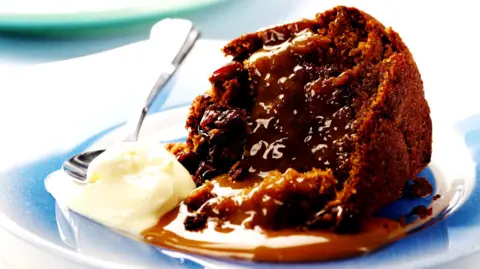The toffee trailblazer and its sticky pudding pride
 Fraser Darrah/Geograph
Fraser Darrah/GeographCumbria is synonymous with the beauty of its Lake District, unforgettable holidays and tasty desserts. One destination was a symbol of all those qualities for five decades, thanks in large part to the stickiness of its toffee pudding.
The Sharrow Bay Hotel is widely regarded as the first country house hotel. Its hospitality became world famous, with celebrities among the travellers from far and wide who flocked to the shores of Ullswater to enjoy the ultimate Lakes holiday.
Under the management of chef Francis Coulson - who bought it after seeing an advert in the Manchester Guardian in 1948 - and his partner Brian Sack, Sharrow Bay's reputation reached dizzying heights.
It became an institution, famed for its decor, friendly atmosphere and, most of all, its cuisine which included one ever-popular indulgence.
"It was originally called sticky toffee pudding and then, as it got copied, they started to call it the icky sticky toffee pudding," said David Naylor, who worked in the Sharrow Bay kitchen in the 1980s.
"I think it just evolved from a date sponge that got made richer and richer, with a lot of cream in the sauce - cream and sugar.
"I do have a copy of [Francis Coulson's] handwritten recipe somewhere for it, but it's a closely guarded secret."
 Getty Images
Getty ImagesThe origins of the sticky toffee pudding are contested. There are those who claim the dessert is Canadian, others who say it came from Australia.
But most agree it was the Sharrow Bay's kitchen that made it world famous, joining other Cumbrian sweets such as Cumberland rum butter, Grasmere gingerbread and Kendal mint cake.
"[Sharrow Bay] dined out on that," Mr Naylor said of the famed toffee treat. "That was one of their very famous dishes, it was just copied everywhere."
The hotel's rich cuisine and generous portions attracted the higher end of the tourist market, but it was also the kind of place families saved up to visit for special occasions.
"There was nothing brash about any of it, it was just this love of food, making it into something you would give to somebody else to give them pleasure - that was Francis all over," Mr Naylor said.
The kitchen used local ingredients way before it became a trend and fish deliveries would arrive for the hotel at Penrith's train station regularly.
But one ingredient was king - cream. The same cream that enriched that famous sticky toffee pudding.

Mr Naylor said: "We used to get a delivery a couple of times a week - it was a vanload of gallons of cream from Calthwaite, from the Jersey herd, and we used to use these gallon buckets and pour cream out and then more cream."
The hotel prided itself on using the best ingredients and also making everything themselves.
Bread was baked twice a day and they made their own croissants.
Mr Naylor said: "It wasn't frenzied, there was never any shouting. It was the gentle art of cooking.
"As Francis always used to say, you had to have a light heart to make light pastry."

Steven Doherty, former head chef at the three Michelin starred Le Gavroche, remembered: "When I went to Sharrow Bay for the first time in '83 I couldn't believe it - we were looked after.
"My God, the hospitality was legendary.
"They quite rightly claimed themselves to be the first true country house hotel and it's safe to say it was."
He said Mr Coulson and Mr Sack "worked like dogs".
"Sharrow Bay was them. It was pretty obvious they were a gay couple, but in those days you didn't really make a big song and dance about it.
"And they were very fortunate to have met each other."

Mr Coulson died in 1998, followed by Mr Sack in 2002.
Sharrow Bay remained open, but became one of the many victims of the Covid-19 pandemic, shutting down in 2020, much to the dismay of the many who had loved it.
The owners of nearby Askham Hall have plans to reopen it this year, though a date has yet to be announced.
Back when Mr Coulson bought Sharrow Bay he described the place as being in "rack and ruin", but in an interview with the BBC in 1988 he said the real secret of the hotel was its location in the heart of the Lake District.
"We were in the most charming position, one couldn't wish for anything better," he explained.
"I've always said that if by chance we behaved ourselves and worked, these views and this district would carry us part of the way, and I think this is true.
"And even now, if there is a wonderful sunset or a cloud effect or a wonderful moon reflection in the lake, one calls everybody to the windows to see or on the terrace.
"It's a great joy to us."
